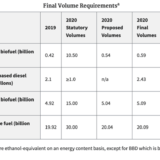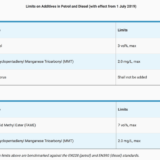
Brazil holds public hearing on draft biodiesel specification
Brazil’s National Agency of Petroleum, Natural Gas and Biofuels or ANP held a public hearing on January 18 regarding a draft resolution that establishes the new national specifications for biodiesel and quality control measures.
Brazil’s National Energy Policy Council has fixed the volume of biodiesel blended with petroleum diesel at the pump to 10% for 2022.
The review of the rules aims to improve the quality of products, mainly due to changes in the percentage of biodiesel in diesel fuel, reports from users and the automotive sector about failures and performance losses in equipment and the need to meet the new phase (P8 ) of the Vehicle Emissions Control Program (Proconve).
The new proposal was built on the basis of technical studies to improve the specifications of biodiesel and diesel fuel, which culminated in the proposal of a new specification and quality control rules that aim to improve consumer satisfaction with the product.
The main changes that were proposed regarding the biodiesel specification and quality control of biodiesel were:
- the reduction in the content of monoglycerides, sodium, potassium, calcium, magnesium and phosphorus, important contaminants of biodiesel
- the addition of a new parameter related to organic contaminants (cold immersion filtration test)
- the reassessment of the temperature tables for Cold Filter Plugging Point (CFPP)
- increasing the oxidative stability of the product from 12 hours to 13 hours in production and the adoption of a new assay (linolenic acid ester content), in order to control the stability of the product
- requiring the control and execution of good practices of handling, transport and storage
The draft resolution underwent a 45-day public consultation, in which 184 suggestions were received.
Contributions received in the consultation and hearing will be evaluated by the technical team, whether or not to change the original draft. The consolidated text will undergo legal analysis by the Federal Prosecutor’s Office within the ANP and approval by the Agency’s collegiate board, before its publication.














